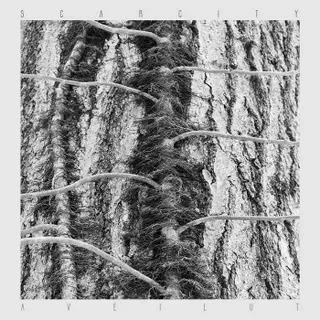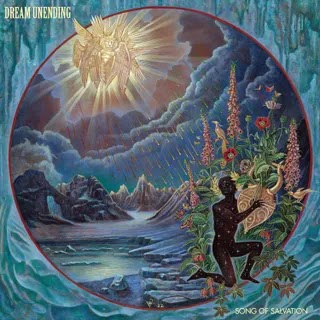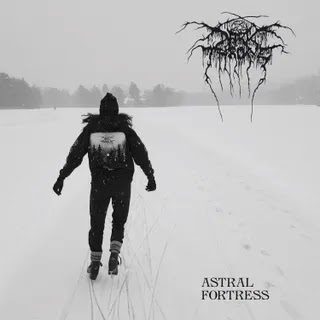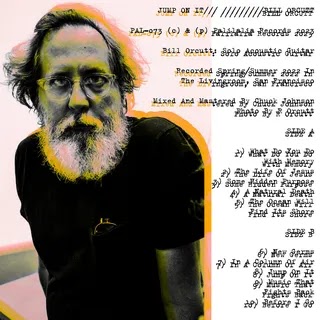The debut collaboration from classical composer Brendon Randall-Myers and metal vocalist Doug Moore is an unflinching testimonial on grief and endurance.
During the lockdown in the spring of 2020, the composer Brendon Randall-Myers would leave his New York apartment largely to do one thing: run in the dark. Sometime after midnight most days of the week, Randall-Myers—a former collegiate runner who nearly turned pro—would zip down empty streets and deserted bike paths, thinking about all he had recently lost. A year earlier, an aunt and a close friend both unexpectedly died within one month. He was still stuck in aveilut, the customary Jewish year of mourning for the dead, a cycle compounded by a recent breakup. Running helped him push through those feelings, as did the music he was tracking back home and contemplating while he exercised in the dark. The result, Aveilut, is his debut as Scarcity, and it’s a compelling testimonial to dealing with the long tail of someone else’s death.
A guitarist in the Glenn Branca Ensemble, Randall-Myers has long flitted at metal’s periphery. His songs in the band Marateck sometimes teased black metal, while his compositions for boundless classical collective Invisible Anatomy and pianist Miki Sawada often hinged on a headbanger’s love of density. His remarkable 2020 album Dynamics of Vanishing Bodies, a harsh-to-halcyon performance for an electric guitar quartet, suggested a theoretical “Instrumental Evening with Krallice” in some posh uptown theater.
But Randall-Myers wanted these new pieces to speak directly to the woe at hand, so directly they actually screamed. He recruited Doug Moore, an accomplished metal vocalist he’d met long ago through running, to write and sing to five interlocking instrumentals, a cohesive suite about emotional upheaval. Aside from a decade of expansive tirades in death-metal adventurers Pyrrhon, Moore has also howled over thrash, doom, and black metal. He was an apt choice, since Randall-Myers’ mix of radiant arpeggios and haunted drones, grim noise and mauling blasts had more to do with fully processing his pain than adhering to strict subgenre convention.
Aveilut opens with a foreboding hum, its glowing synthesizers slowly strangled by a tense riff and marching drums that push toward a feverish gallop. This is claustrophobic black metal, caked in the kind of compounding overtones you might expect from a Branca acolyte; it feels overwhelmed and overwhelming, mirroring a mind incapable of outpacing its own burdens. Moore arrives after six minutes to roar a short, reassuring psalm: “They are never truly gone/Those who have shed their forms.” He seems to be convincing Randall-Myers, trying to shout down his collaborator’s suffering.
Moore returns to these same lines 20 minutes later, at the start of “IV,” but he finds the comforting words empty now. He hisses the verse through sculpted doom, colossal drums occasionally punctuating the long tones and feedback screeches. These dual settings for the same text speak to the unsteady way we mourn, how we sometimes slip back into sadness we thought we’d already overcome. “IV” ends in a low tide of curdled noise, like Merzbow trying to make nachtmusik. “We, the shattered, we shall endure,” Moore seethes through the haze of broken circuits, arriving at a terrible truth most of us will one day face—for survivors, someone else’s death is often hell.
Every facet of death has been fodder for one form of metal or another, from lurid celebrations to melodramatic wails. But as a relative outsider, Randall-Myers approaches the concept with a thoughtfulness and honesty that’s independent of expectation or orthodoxy. Aveilut sounds how loss actually feels—spans of misery, flashes of hope, bouts of anger, all lumped into a messy collage that has little to do with some clean Kübler-Ross progression. Where “IV” wallows in despair, for instance, “II,” the album’s masterstroke, tries to find meaning or even redemption in its certainty. An 11-minute sprawl of backlit black metal, coruscant with guitar harmonies and relentless with roiling drums, it has the same passion and intensity as Blut Aus Nord or early Liturgy. “Be without grief when they bear down, those years,” Moore demands, attempting to negotiate with a mortality he well knows is merciless. Desperation soon follows.
Perhaps it’s strange to find such a harsh record about death life-affirming, to hear in its menacing tones and lyrical opprobrium any reassurance. But for Aveilut, Randall-Myers took a particularly challenging time as a chance to try something with which he’d long toyed. Alongside a friend, he turned deep troubles into a work of endurance, of running into the dark hoping that someday you might even emerge from it for a spell.
















0 comments:
Post a Comment